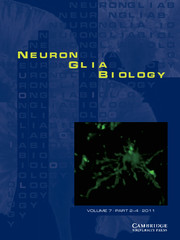Crossref Citations
This article has been cited by the following publications. This list is generated based on data provided by
Crossref.
Hanani, Menachem
2010.
Satellite glial cells: more than just ‘rings around the neuron’.
Neuron Glia Biology,
Vol. 6,
Issue. 1,
p.
1.
Hanani, Menachem
2010.
Satellite glial cells in sympathetic and parasympathetic ganglia: In search of function.
Brain Research Reviews,
Vol. 64,
Issue. 2,
p.
304.
Szurszewski, Joseph H.
and
Linden, David R.
2012.
Physiology of the Gastrointestinal Tract.
p.
583.
Wu, Ann
Green, Colin R.
Rupenthal, Ilva D.
and
Moalem‐Taylor, Gila
2012.
Role of gap junctions in chronic pain.
Journal of Neuroscience Research,
Vol. 90,
Issue. 2,
p.
337.
Hanani, Menachem
and
Spray, David C.
2012.
Neuroglia.
p.
122.
Gong, Kerui
Kung, Ling-Hsuan
Magni, Giulia
Bhargava, Aditi
Jasmin, Luc
and
Costigan, Michael
2014.
Increased Response to Glutamate in Small Diameter Dorsal Root Ganglion Neurons after Sciatic Nerve Injury.
PLoS ONE,
Vol. 9,
Issue. 4,
p.
e95491.
Hanani, Menachem
2015.
Role of satellite glial cells in gastrointestinal pain.
Frontiers in Cellular Neuroscience,
Vol. 9,
Issue. ,
Liu, W.
Edin, F.
Atturo, F.
Rieger, G.
Löwenheim, H.
Senn, P.
Blumer, M.
Schrott-Fischer, A.
Rask-Andersen, H.
and
Glueckert, R.
2015.
The pre- and post-somatic segments of the human type I spiral ganglion neurons – Structural and functional considerations related to cochlear implantation.
Neuroscience,
Vol. 284,
Issue. ,
p.
470.
Jeanson, Tiffany
Duchêne, Adeline
Richard, Damien
Bourgoin, Sylvie
Picoli, Christèle
Ezan, Pascal
Mouthon, Franck
Giaume, Christian
Hamon, Michel
and
Charvériat, Mathieu
2016.
Potentiation of Amitriptyline Anti-Hyperalgesic-Like Action By Astroglial Connexin 43 Inhibition in Neuropathic Rats.
Scientific Reports,
Vol. 6,
Issue. 1,
Ajijola, Olujimi A.
Hoover, Donald B.
Simerly, Thomas M.
Brown, T. Christopher
Yanagawa, Jane
Biniwale, Reshma M.
Lee, Jay M.
Sadeghi, Ali
Khanlou, Negar
Ardell, Jeffrey L.
and
Shivkumar, Kalyanam
2017.
Inflammation, oxidative stress, and glial cell activation characterize stellate ganglia from humans with electrical storm.
JCI Insight,
Vol. 2,
Issue. 18,
Adães, Sara
Almeida, Lígia
Potes, Catarina S
Ferreira, Ana Rita
Castro-Lopes, José M
Ferreira-Gomes, Joana
and
Neto, Fani L
2017.
Glial activation in the collagenase model of nociception associated with osteoarthritis.
Molecular Pain,
Vol. 13,
Issue. ,
Feldman-Goriachnik, Rachel
Wu, Bing
and
Hanani, Menachem
2018.
Cholinergic responses of satellite glial cells in the superior cervical ganglia.
Neuroscience Letters,
Vol. 671,
Issue. ,
p.
19.
Feldman-Goriachnik, Rachel
and
Hanani, Menachem
2019.
The effects of sympathetic nerve damage on satellite glial cells in the mouse superior cervical ganglion.
Autonomic Neuroscience,
Vol. 221,
Issue. ,
p.
102584.
Sarrouilhe, Denis
Mesnil, Marc
and
Dejean, Catherine
2019.
Targeting Gap Junctions: New Insights into the Treatment of Major Depressive Disorder.
Current Medicinal Chemistry,
Vol. 26,
Issue. 20,
p.
3775.
Schmitt, Linda-Isabell
Leo, Markus
Kutritz, Andrea
Kleinschnitz, Christoph
and
Hagenacker, Tim
2020.
Activation and functional modulation of satellite glial cells by oxaliplatin lead to hyperexcitability of sensory neurons in vitro.
Molecular and Cellular Neuroscience,
Vol. 105,
Issue. ,
p.
103499.
Lucarini, Elena
Seguella, Luisa
Vincenzi, Martina
Parisio, Carmen
Micheli, Laura
Toti, Alessandra
Corpetti, Chiara
Del Re, Alessandro
Squillace, Silvia
Maftei, Daniela
Lattanzi, Roberta
Ghelardini, Carla
Di Cesare Mannelli, Lorenzo
and
Esposito, Giuseppe
2021.
Role of Enteric Glia as Bridging Element between Gut Inflammation and Visceral Pain Consolidation during Acute Colitis in Rats.
Biomedicines,
Vol. 9,
Issue. 11,
p.
1671.
Getsy, Paulina M.
Coffee, Gregory A.
and
Lewis, Stephen J.
2023.
Loss of ganglioglomerular nerve input to the carotid body impacts the hypoxic ventilatory response in freely-moving rats.
Frontiers in Physiology,
Vol. 14,
Issue. ,
Birren, Susan J.
Goodrich, Lisa V.
and
Segal, Rosalind A.
2025.
Satellite Glial Cells: No Longer the Most Overlooked Glia.
Cold Spring Harbor Perspectives in Biology,
Vol. 17,
Issue. 1,
p.
a041367.


